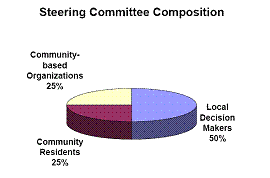|
Victims of Crime
Introduction
Violent and property crime remain at the lowest rates in 30 years,
according to the U.S. Department of Justice, Bureau
of Justice Statistics latest 2003
National Crime Victimization Survey. While there is a positive trend
in the reduction of crime across the nation, there still remains a need
for social services and programs to assist those whose lives have been
affected and impacted by crime. Through its various bureaus and offices,
the Department’s Office of
Justice Programs aims to prevent and control crime, improve the
criminal and juvenile justice systems, and assist crime victims.

Programs
Helping Outreach Programs Expand (HOPE)
Helping Outreach Programs Expand (HOPE) provides funding to faith-based
and other community-based, grassroots crime victim services organizations
to support program development efforts such as training, volunteer recruitment
and retention, and printing and dissemination of information materials.
HOPE aims to foster the development of grassroots crime victim service
providers to expand both public visibility and outreach to victims,
thereby increasing the number of available service providers.
- The Office for Victims
of Crime awards grants under this program of no more than $10,000
to faith-based and other community organizations. Click here for
application information. Applications for this program are accepted
year round.
Back to Top
Transitional Housing Assistance Grants
Program
The Transitional Housing Assistance Grant Program supports organizations
that provide assistance to individuals who are in need of transitional
housing or housing assistance, as a result of fleeing a situation of
domestic violence, and for whom emergency shelter services or other
crisis intervention services are unavailable or insufficient. Grants
may be used for programs that provide short-term housing assistance,
including rental or utilities payment assistance and assistance with
related expenses, and support services designed to enable individuals
to locate and secure permanent housing, as well as integrate into a
community. Grantees provide a broad range of individualized services
such as transportation, counseling, childcare services, case management,
employment counseling, and other assistance.
- The Office on Violence Against Women awards grants
to state governments, local units of government, Indian tribal governments,
and nongovernmental private entities, including faith-based and other
community organizations. Click here to
learn more about this program.
Back to Top
Victims of Crime Act Formula Grant Program
Victims of Crime Act (VOCA) formula grants are intended to support
victim assistance services for victims and survivors of domestic violence,
sexual assault, child abuse, drunk driving, homicide, and other crimes.
VOCA funds support criminal justice advocacy, emergency legal assistance,
information and referral services, personal advocacy, and assistance
with filing crime victims compensation claims.
- The Office for Victims
of Crime awards grants to each state government, Washington,
D.C., and U.S. territorial governments. Faith-based and other community
organizations may apply for funds from their state government to
provide victim services. A list of state agencies that administer
these funds can be obtained by clicking here.
Back to Top
Weed and Seed
Weed and Seed is
foremost a strategy--rather than a grant program-- which aims to prevent,
control, and reduce violent crime, drug abuse, and gang activity in
targeted high-crime neighborhoods across the country. Weed and Seed
sites range in size from several neighborhood blocks to 15 square miles,
and there are over 350 sites nationwide. The strategy involves a two-pronged
approach: (1) Law enforcement agencies and prosecutors cooperate in "weeding
out" criminals who participate in violent crime and drug abuse,
attempting to prevent their return to the targeted area; (2) and "Seeding" brings
human services to the area, encompassing prevention, intervention, treatment,
and neighborhood revitalization. A community-orientated policing component
bridges weeding and seeding strategies. Officers obtain helpful information
from area residents for weeding efforts while they aid residents in
obtaining information about community revitalization and seeding resources.
The Community
Capacity Development Office (CCDO) oversees the Weed and Seed initiative.
- Faith-based and other community organizations may serve as the
fiscal agent for Weed and Seed sites. Faith-based and other community
organizations may also participate in local Weed and Seed programming
and funding at existing sites by contacting their neighborhood Weed
and Seed Steering Committee. To reach a local Weed and Steering Committee,
contact its site coordinator by clicking here.

Contact Information
Department of Justice, Office of Justice Programs
Community Capacity Development Office
810 Seventh Street, NW, Sixth Floor
Washington , DC 20531
Contact
Back to Top
Resources

The Office of Justice Programs, Office
for Victims of Crime administers programs that benefit victims of
crime. OVC provides substantial funding to state victim assistance and
compensation programs-the lifeline services that help victims to heal.
The agency supports trainings designed to educate criminal justice and
allied professionals regarding the rights and needs of crime victims.
OVC also sponsors an annual event in April to commemorate National
Crime Victims Rights Week (NCVRW).
Help for Victims
The following topics offer links to information resources that may
be of interest to victims of crime. For additional information on available
services in your area, visit OVC's
Directory of Crime Victim Services.
Back to Top

NCJRS is a federally funded resource offering justice and substance
abuse information to support research, policy, and program development
worldwide. By registering with NCJRS, you can remain informed about
new publications, grants and funding opportunities, and other news and
announcements.

Back to Top |

